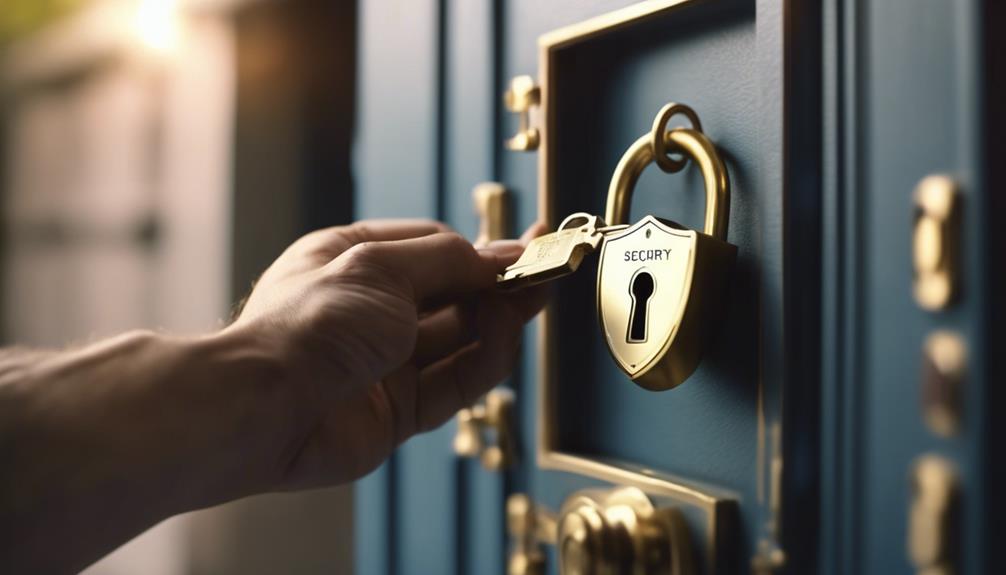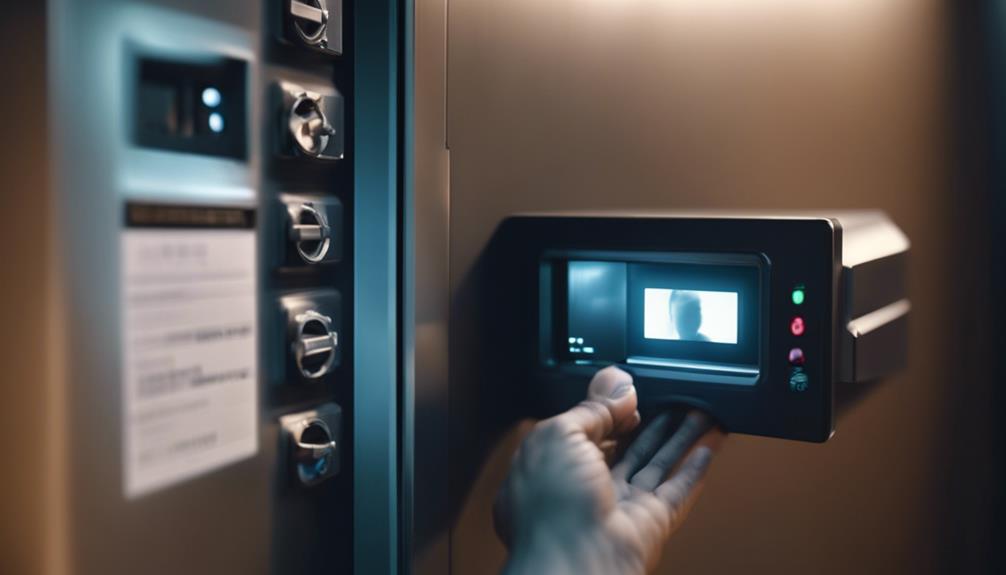Maintaining security in your accounting system as a non-resident involves navigating a complex landscape of regulations and standards to protect sensitive financial data. From understanding compliance requirements to implementing robust cybersecurity measures, the path to safeguarding your information is multifaceted and critical.
As you delve into this realm, exploring secure third-party apps, physical security protocols, data encryption practices, regular password updates, and access control limitations will be key in fortifying your accounting system.
Key Takeaways
- Utilize secure third-party apps and update regularly for high security standards.
- Implement physical security measures like laptop locks and passcode authentication.
- Encrypt sensitive financial data and regularly update encryption protocols.
- Establish strict access control, utilize multi-factor authentication, and conduct periodic access reviews.
Secure Third Party Apps
When securing your accounting system as a non-resident, employing third-party apps with robust security measures is crucial for safeguarding sensitive financial data. Tax information, data protection, and privacy are paramount when dealing with financial information. Opt for third-party apps that adhere to high Security Standards to mitigate security vulnerabilities.
Regularly updating these apps is essential to patch any potential security loopholes that hackers could exploit. Ensure that the firewall protection is in place and that all software is up to date for enhanced security measures when utilizing third-party apps. It's also advisable to enable auto updates for apps, software, and browsers to stay protected against emerging threats.
Physical Security Measures

Implement robust physical security measures to fortify the protection of your accounting systems against unauthorized access and potential breaches. To enhance the physical security of your accounting systems, consider the following:
- Laptop Locks: Utilize laptop locks to secure your devices and prevent unauthorized access to sensitive accounting data.
- Firewall Protection: Ensure that organization-provided devices have firewall protection implemented to defend against external threats.
- Passcode Authentication and Timeout Restrictions: Implement passcode authentication and set up timeout restrictions on devices to add an extra layer of security and protect your accounting data physically.
Data Encryption Practices
To further safeguard your accounting systems against unauthorized access and data breaches, the implementation of robust data encryption practices is imperative. Encrypting sensitive financial information is crucial in preventing unauthorized access.
Utilizing code signing certificates can enhance the encryption of your applications, boosting overall data security.
Consider implementing disk drive encryption to protect all stored data comprehensively. Encryption tools play a vital role in securing financial information during online transactions, ensuring that data remains safe and confidential.
Regularly updating encryption protocols is essential to maintain the effectiveness of your data encryption measures over time. By adhering to these data encryption best practices, you can significantly reduce the risk of data breaches and ensure the security of your accounting system.
Make sure to stay informed about the latest advancements in data encryption to keep your systems protected against evolving threats.
Regular Password Updates

Regularly updating your passwords is a fundamental practice in fortifying the security of your accounting system against unauthorized access and potential data breaches. Changing passwords frequently reduces the risk of security breaches and data theft. Strong and unique passwords are essential for enhancing the security of your accounting system. Implementing a password policy that mandates regular updates can strengthen cybersecurity measures. Regular password updates are a proactive measure to safeguard sensitive financial information from cyber threats.
When it comes to password updates, consider the following:
- Frequent Changes: Regularly changing your passwords helps mitigate the risk of unauthorized access to your financial data.
- Strong Passwords: Creating complex passwords with a combination of letters, numbers, and special characters adds an extra layer of security.
- Policy Enforcement: Implementing a password policy that enforces regular updates ensures continuous protection of your sensitive financial information.
Access Control and Limitations

Enhance the security of your accounting system by establishing strict access control and limitations based on job responsibilities. Implement role-based access control to ensure that users only have access to the information necessary for their roles. Utilize multi-factor authentication, requiring users to provide two or more verification factors to access the system, adding an extra layer of security. Regularly review and update user access permissions to follow the principle of least privilege access, granting users only the permissions they need to fulfill their duties. Monitor and log user activities within the accounting system to track any unauthorized access attempts or suspicious behavior. Conduct periodic access reviews to revoke access for employees who no longer require system privileges, reducing the risk of unauthorized access. By implementing these access control measures, you can safeguard sensitive financial data and mitigate the potential for security breaches.
| Key Points | Details | Benefits |
|---|---|---|
| Role-Based Access Control | Restrict system access based on job roles | Improved data security |
| Multi-Factor Authentication | Two or more verification factors for logins | Enhanced login security |
| Least Privilege Access | Granting minimal permissions to users | Reduced risk of data exposure |
| User Activity Monitoring | Track and log user actions within the system | Early detection of unauthorized access attempts |
| Periodic Access Reviews | Regularly review and update user privileges | Ensuring access is up to date |
Frequently Asked Questions
How Do You Secure Accounting Information?
To secure accounting information, you must implement robust data encryption, access control, and password protection. Utilize two-factor authentication for added security.
Regularly monitor your system for any suspicious activities. Ensure secure backups are in place to prevent data loss. Keep your software updated with the latest security patches.
Train your employees on cybersecurity practices to strengthen your system's defenses.
How Do You Protect Accounting Data From Third Party Access?
To protect accounting data from third party access, it is essential to implement a range of security measures including:
- Data encryption
- Access control
- Secure passwords
- Two-factor authentication
- Regular backups
- Firewall protection
- Security audits
- Employee training
Encrypting sensitive information, limiting access based on roles, using strong passwords, activating two layers of authentication, backing up data frequently, maintaining a secure firewall, conducting security audits, and educating employees on best practices collectively enhance the security of your accounting system.
What Is Security in Accounting Information System?
Security in an accounting information system involves safeguarding financial data through measures like data encryption, access controls, and intrusion detection.
Additional layers like two-factor authentication, regular audits, secure backups, and employee training enhance security.
Incident response plans are crucial for addressing breaches promptly.
These combined efforts ensure the integrity and confidentiality of financial information, safeguarding against fraud, errors, and data breaches that could impact decision-making and financial reporting.
Why Is Security Important for Accountants?
Security is vital for accountants as it shields sensitive data from unauthorized access and breaches. It helps prevent fraud, errors, and data manipulation, ensuring compliance with financial regulations. Safeguarding client information maintains trust and reputation.
Robust security measures mitigate risks and potential financial losses. Data encryption, user authentication, firewall protection, regular backups, security audits, strong passwords, access control, and malware detection are essential components in fortifying security measures.
Conclusion
In conclusion, ensuring security in your accounting system as a non-resident is like building a fortress around your financial data.
By implementing robust security measures such as encryption, password updates, and access control, you can fortify your defenses against potential threats.
Remember, in the world of finance, staying one step ahead of cyber risks is key to safeguarding your assets and maintaining regulatory compliance.
Stay vigilant and proactive in protecting your accounting system like a vigilant guard protecting a castle.